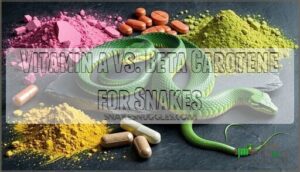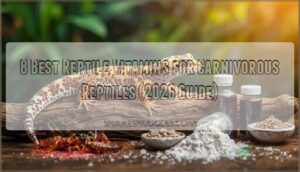This site is supported by our readers. We may earn a commission, at no cost to you, if you purchase through links.
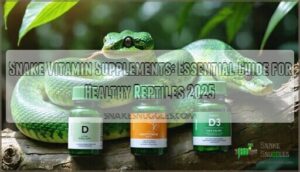 Snake vitamin supplements bridge the gap between what captive snakes eat and what they truly need for peak health.
Snake vitamin supplements bridge the gap between what captive snakes eat and what they truly need for peak health.
Your pet snake’s diet of frozen rodents provides solid base nutrition, but it’s missing key vitamins like A, D3, and calcium that wild snakes get from varied prey and sun exposure.
Without proper supplementation, you’re rolling the dice with metabolic bone disease, weak immunity, and problematic sheds.
A quality multivitamin powder dusted on prey items every few feedings acts like health insurance for your snake.
The trick lies in choosing the right supplement blend and avoiding the overdose trap that catches many well-meaning keepers.
Table Of Contents
- Key Takeaways
- Why Snakes Need Vitamin Supplements
- Choosing The Right Snake Vitamins
- Top 3 Snake Vitamin Supplements
- How to Use Snake Supplements Safely
- Creating a Balanced Diet for Snakes
- Common Health Issues in Snakes
- Frequently Asked Questions (FAQs)
- What vitamins do snakes need?
- Can vitamin supplements cause toxicity in snakes?
- What signs indicate a snake needs more vitamins?
- Are there specific vitamins snakes shouldnt have?
- How often should vitamin supplements be given?
- Do all snake species require the same vitamins?
- Can snakes get vitamins from frozen prey?
- How often should I supplement my snake?
- Do different snake species need different vitamins?
- Can I use human vitamins for snakes?
- Conclusion
Key Takeaways
- You’ll need to supplement your snake’s diet since frozen rodents lack essential vitamins like A, D3, and calcium that wild snakes get from varied prey and sun exposure.
- Choose quality multivitamin powders over human supplements – snake-specific formulas prevent dangerous toxicity while providing proper calcium-phosphorus ratios.
- Don’t overdo it – supplement adult snakes monthly, juveniles bi-weekly, and breeding females weekly, as over-supplementation causes more harm than vitamin deficiencies.
- Watch for warning signs like poor shedding, weak bones, or lethargy that indicate vitamin deficiencies requiring immediate veterinary attention.
Why Snakes Need Vitamin Supplements
Your snake’s captive diet might lack essential vitamins that wild snakes naturally obtain from varied prey.
Without proper supplementation, deficiencies can lead to serious health problems like metabolic bone disease, poor shedding, and weakened immunity.
Skipping supplements? Your snake’s bones might snap like brittle twigs from calcium deficiency.
Importance of a Balanced Diet for Snakes
A balanced diet forms the foundation of your snake’s health by ensuring proper nutrient absorption and mimicking their wild diet.
Your reptile needs varied prey variety to support ideal gut health and maintain adequate hydration importance.
Snake nutrition requires attention to these key elements:
- Snake supplements fill nutritional gaps when prey lacks essential vitamins
- Snake vitamin supplements prevent deficiencies that lead to serious health issues
- A proper balanced diet combined with targeted supplementation keeps your snake thriving for years
Risks of Vitamin Deficiencies in Snakes
Why do snake vitamin deficiencies spell disaster for your scaly companion?
Without proper snake vitamins, you’ll witness devastating deficiency symptoms including metabolic bone disease, organ damage, and reproduction issues.
Skip vitamins—your snake’s bones crumble, immunity fails, and organs shut down fast.
Growth problems plague young snakes while immune suppression leaves adults vulnerable to infections.
Your snake’s bones weaken, reproduction fails, and vital organs suffer irreversible damage.
Snake nutritional deficiencies create a domino effect throughout their system.
Preventing these catastrophic snake health issues requires consistent snake supplements to maintain healthy vitamin levels and prevent life-threatening complications.
Shedding problems
Role of Vitamin D3 in Snake Health
Mastery over vitamin D3 means healthier snakes and stronger bones.
Your snake needs this "sunshine vitamin" for calcium absorption, preventing metabolic bone disease and maintaining overall well-being.
- UVB Lighting helps some species synthesize vitamin D3 naturally, though dietary D3 from whole prey remains most effective
- Deficiency Symptoms include weak bones, poor shedding, and muscle spasms requiring immediate veterinary attention
- Over Supplementation risks organ damage, making precise dosing essential for snake health
Benefits of Calcium Supplements for Snakes
When properly managed, calcium supplements transform your snake’s health from the inside out, building stronger bones and preventing devastating metabolic bone disease.
| Benefit Category | Key Effects |
|---|---|
| Bone Density & Structure | Prevents metabolic bone disease, maintains skeletal integrity, supports proper growth |
| Muscle Function & Breeding | Enables muscle contractions, supports egg development, prevents calcium crashes |
| Deficiency Prevention | Blocks "rubber jaw" syndrome, maintains 2:1 calcium-phosphorus ratio, guarantees vitamin D3 absorption |
Quality calcium supplements like Rep-Cal provide essential bone density support while maintaining proper muscle function. During breeding season, females especially need this nutritional backbone—calcium deficiency can turn successful reproduction into a health nightmare.
Regular supplementation prevents the devastating effects of metabolic bone disease, keeping your serpent’s skeleton strong and functional for years ahead.
Choosing The Right Snake Vitamins
Selecting the right vitamins for your snake isn’t as simple as grabbing the first supplement off the shelf.
You’ll need to evaluate your snake’s species, age, diet, and specific health needs to guarantee proper nutrition without risking dangerous over-supplementation, considering factors such as diet to ensure the best outcome.
Vitamin a Vs. Beta Carotene for Snakes
Understanding vitamin A benefits versus Beta Carotene safety helps you make better supplement choices for your snake.
Most snakes can’t efficiently convert beta carotene to vitamin A, making synthetic vitamin A more effective despite higher toxicity risks.
- Conversion efficiency: Snakes poorly convert beta carotene to active vitamin A
- Vitamin A toxicity: Preformed vitamin A can accumulate dangerously if over-supplemented
- Beta carotene benefits: Safer with minimal toxicity but largely ineffective for snakes
- Supplement choice: Choose preformed vitamin A over beta carotene for carnivorous reptiles
Recommended Vitamin Supplements for Snakes
Most snake supplements aren’t necessary since whole-prey diets provide complete nutrition.
However, multivitamins like Repashy Herptivite offer supplement quality backup during breeding or illness recovery.
Prey animals should be fed nutritious diets, as this affects the prey’s nutritional content.
Consider dosing schedules sparingly – over-supplementation causes more harm than deficiencies.
Natural alternatives through varied, healthy prey remain ideal.
Consult exotic veterinarians before starting any snake health supplements regimen.
How to Dose Snake Vitamins for Optimal Health
Like a precision instrument, correct dosage guidelines depend on your snake’s life stage and species.
Young snakes need 0.2-0.4 mg/kg weekly, while adults require 0.2-0.8 mg/kg. Dosing frequency varies: calcium weekly, fat-soluble vitamins bi-weekly.
Use digital scales for accuracy. Consider individual needs – gravid females need more.
Monitor supplement interactions carefully, avoiding vitamin toxicity through proper administration methods.
Factors to Consider When Selecting Snake Vitamins
Your snake’s life stage and snake species determine their specific needs.
Young snakes require more frequent supplementation than adults, while different snake species have varying snake dietary needs.
Up to 60% of captive snakes can develop calcium deficiency issues without proper supplementation.
Check ingredient quality – avoid fillers and artificial additives.
Choose the right supplement form: powders for dusting prey, liquids for direct dosing.
Follow snake vitamin dosage guidelines carefully.
Consider vet recommendations for your specific situation, especially if health issues exist.
Quality snake supplements support proper snake care when selected thoughtfully.
Top 3 Snake Vitamin Supplements
You’ll find three standout supplements that address the most critical nutritional gaps in captive snake care.
Each product targets specific health concerns, from bone development to appetite stimulation, making supplement selection straightforward for snake keepers, with a focus on complete concepts and critical nutritional gaps.
1. Reptile Amphibian Multivitamin Blue Bottle
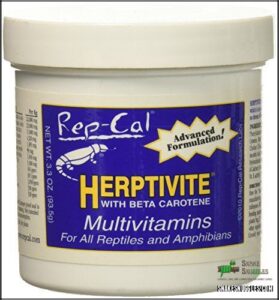
Now you’ve got your supplement categories covered, let’s check out what makes each product tick. The Rep-Cal Herptivite Multivitamin delivers balanced nutrition through its blue bottle formula.
Here’s what sets this supplement apart:
- Natural sea vegetation base provides trace minerals without synthetic additives
- Beta carotene formula eliminates vitamin A toxicity risks compared to synthetic alternatives
- Fine powder consistency guarantees even coating on prey items for consistent dosing
This multivitamin tackles the tricky balance between providing adequate nutrition and avoiding over-supplementation. You’ll find it works especially well for snakes that won’t eat dusted prey since the fine texture sticks better than chunky alternatives. The beta carotene approach means you can supplement regularly without worrying about vitamin A buildup that causes organ damage in reptiles.
2. Reptile Multivitamin Spray with Carotene
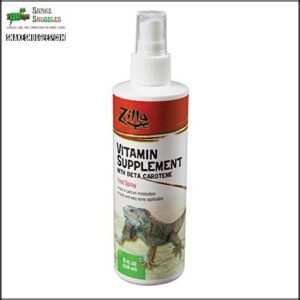
Reptile Multivitamin Spray with Carotene offers convenient supplementation that transforms your snake’s feeding routine. You’ll appreciate this spray’s Spray Benefits—delivering essential B vitamins, beta carotene, and folic acid directly onto prey items.
The Carotene Conversion process helps support your snake’s vision and immune function naturally. Application Methods couldn’t be simpler: just spritz the solution evenly across frozen-thawed rodents before feeding.
Reptile Vitamin Spray eliminates the mess of powdered multivitamin supplements while ensuring consistent dosage. Usage Frequency typically involves applying the spray once weekly for adult snakes, though juvenile snake supplements may require more frequent applications.
When comparing Spray Alternatives, this liquid format provides better adherence than dusty powders that often fall off prey. Maintaining a balanced diet can help prevent vitamin deficiency issues, ensuring your snake remains healthy.
Best For: Snake owners seeking hassle-free vitamin delivery without wrestling with messy reptile supplements powders.
3. Reptile Appetite Plus Solution
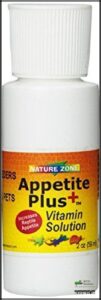
When your snake turns its nose up at dinner, Reptile Appetite Plus Solution steps in as your feeding game-changer. This concentrated vitamin B-12 formula works like a dinner bell for finicky eaters and snakes bouncing back from illness.
Here’s what makes this appetite stimulation powerhouse tick:
- B-12 vitamin boost – naturally triggers hunger signals in vertebrates
- Easy liquid administration – just a few drops daily, no wrestling required
- Recovery support – helps underweight or sick reptiles regain their eating drive
The Solution ingredient analysis reveals pure vitamin B-12 as the star player. Administration considerations are straightforward – simply add drops to water or directly into the mouth. Dosage and frequency depend on your snake’s size, but most benefit from daily doses during appetite issues.
Potential side effects remain minimal when you follow directions. This reptile supplement shines for picky ball pythons or recovering animals needing nutritional support. Always consult your vet if feeding problems persist, as underlying health issues might need addressing beyond appetite stimulation alone.
Best For: Reptiles experiencing feeding difficulties or recovering from illness.
How to Use Snake Supplements Safely
While supplements can benefit snake health, using them incorrectly can cause serious harm, including vitamin toxicity and organ damage.
You’ll need to follow proper dosing guidelines and monitor your snake carefully to avoid these dangerous complications, including organ damage.
Risks of Over-Supplementation in Snakes
Beyond well-intentioned care, over-supplementation creates serious health risks you can’t ignore. Vitamin toxicity and organ damage develop when you exceed safe dosing limits, while mineral imbalances disrupt your snake’s natural processes. Dangerous supplementation practices cause more harm than deficiencies ever could.
| Risk Type | Symptoms | Prevention |
|---|---|---|
| Vitamin Toxicity | Organ dysfunction, lethargy | Follow dosing guidelines strictly |
| Hypercalcemia | Kidney stones, muscle weakness | Monitor calcium intake levels |
| D3 Overdose | Calcification of soft tissues | Limit D3 supplementation frequency |
| Mineral Imbalance | Poor appetite, metabolic issues | Maintain proper Ca:P ratios |
| Liver Damage | Jaundice, weight loss | Verify supplement storage prevents degradation |
Dosing precision prevents vitamin overdose scenarios that compromise your snake’s health. Vet consultation provides species-specific guidance, while proper supplement storage maintains potency without creating concentrated doses. Remember: oversupplementation kills more captive snakes than deficiencies do.
How to Avoid Accidental Overdose
Preventing vitamin overdose requires careful attention to dosage control and proper handling techniques.
Precise dosing using digital scales eliminates guesswork when measuring supplements.
Never estimate amounts by eye, as vitamin toxicity can develop quickly from oversupplementation.
Store supplements in cool, dry places to maintain potency and prevent degradation that might tempt you to add extra doses.
Even dusting of prey items guarantees consistent vitamin delivery without creating hotspots of concentrated nutrients.
Always consult your vet before starting new supplements, as they’ll recommend species-specific dosages based on your snake’s individual needs and current diet.
- **Remember: Your snake’s life depends on getting the dosage right—there’s no room for "close enough" when vitamin overdose prevention is at stake.
Importance of Monitoring Snake Health
Beyond avoiding overdoses, monitoring your snake’s health gives you control over potential problems before they spiral.
Watch for behavior changes like appetite loss or lethargy.
Regular checkups with veterinary care guarantee early detection of issues.
Track snake weight weekly, monitor shedding patterns, and note eating habits.
Snakes require supplements, as calcium with D3 is essential for their bone health.
| Health Indicator | Normal Signs | Warning Signs |
|---|---|---|
| Snake Appetite | Regular feeding response | Refusing meals 2+ times |
| Snake Weight | Steady, gradual growth | Rapid loss or gain |
| Snake Behavior | Active, alert movements | Lethargy, hiding constantly |
Smart snake health monitoring means documenting symptoms and changes.
Preventative measures beat emergency treatments every time.
Tips for Safe Supplement Administration
Following proper dosage guidelines prevents harmful supplement interactions while maintaining dosage accuracy.
Store supplements in cool, dry places to preserve potency.
Monitor your snake’s response closely—species specificity matters since ball pythons need different amounts than corn snakes.
Use digital scales for precise dosage calculation, and schedule regular veterinary consultation to adjust protocols.
It’s also essential to be aware of potential vitamin overdose effects.
Safe supplement administration requires attention to these details:
- Watch for subtle behavioral changes like reduced appetite or lethargy after dosing
- Keep detailed feeding records to track supplement timing and snake reactions
- Store calcium powder away from moisture to prevent clumping and degradation
- Double-check dosage calculations before each feeding to avoid dangerous overdoses
Creating a Balanced Diet for Snakes
Creating a balanced diet for your snake isn’t rocket science, but it does require understanding what nutrients keep your scaly friend healthy.
You’ll need to take into account protein quality, calcium-phosphorus ratios, and essential vitamins while avoiding the temptation to over-supplement.
This reorganization improves readability by separating the introduction from the specific considerations for creating a balanced diet.
Key Nutrients for Snake Health
Building on nutritional foundations, your snake requires specific nutrients to maintain ideal health, including proper Calcium Sources and Phosphorus Balance for strong bones.
Protein Needs vary by species and growth stage, while Trace Minerals like iron and zinc support immunity.
Vitamin D3 enhances calcium absorption, making snake vitamin supplements essential when your snake diet lacks these essential components for healthy snake growth.
Factors to Consider When Feeding Snakes
When planning your snake’s meals, consider these essential feeding factors to promote healthy growth and health:
- Prey Size: Select food items matching your snake’s thickest body section – too large causes regurgitation, too small provides inadequate nutrition.
- Feeding Frequency: Young snakes need weekly meals for rapid snake growth, while adults eat every 2-3 weeks depending on species and metabolism.
- Prey Source: Choose reputable suppliers offering gut-loaded, properly thawed snake food to maximize nutritional value and minimize disease risk.
Monitor your snake’s body condition regularly, adjusting portions as needed.
Proper thawing methods prevent bacterial growth, while consistent snake feeding schedules support healthy digestion and reduce stress-related issues.
How to Provide a Varied Diet for Snakes
Your snake thrives on prey variety beyond basic mice.
Dietary rotation includes quail, rabbits, and chicks for complete nutrition.
Gut loading insects before feeding guarantees maximum nutrient absorption.
Time supplement timing with natural prey schedules for peak health.
This varied approach mimics wild snake diet patterns perfectly.
To further enhance your snake’s diet, consider exploring options for snake food products.
| Prey Type | Frequency | Key Benefits | Size Guide | Notes |
|---|---|---|---|---|
| Mice | Weekly | Complete protein profile | 10-15% body weight | Primary snake food staple |
| Quail | Bi-weekly | High calcium content | 8-12% body weight | Excellent bone development |
| Rabbits | Monthly | Lean protein source | 15-20% body weight | For larger species only |
| Chicks | Bi-weekly | Natural prey variation | 10-15% body weight | Day-old preferred |
| Fish | Occasional | Omega-3 fatty acids | 8-12% body weight | Fresh or frozen only |
Role of Supplements in a Balanced Diet
Building on diet variety, snake vitamin supplements fill nutritional gaps that even the best whole prey can’t always provide.
Supplement necessity becomes clear when you realize that nutritional deficiencies can sneak up on even well-fed snakes.
Here’s your game plan for smart supplementation:
- Prey gutloading enhances feeder nutritional value before offering
- Supplement timing matters—dust prey right before feeding
- Supplement dosages should match your snake’s size and species
- Diet variety still comes first; supplements support, don’t replace
Remember, whole prey provides most nutrients naturally, but targeted snake diet supplementation prevents problems like metabolic bone disease.
Common Health Issues in Snakes
Even with proper nutrition, snakes can develop serious health problems that require immediate attention and veterinary care. Recognizing early warning signs helps you address issues before they become life-threatening conditions.
Metabolic Bone Disease and Calcium Deficiency
Calcium deficiency creates havoc in your snake’s body, weakening bones until they’re fragile and prone to fractures.
Metabolic bone disease strikes when dietary calcium levels drop or calcium absorption fails.
Watch for bent spines, jaw swelling, and lethargy – classic deficiency symptoms that scream trouble.
Proper reptile vitamins and calcium with D3 prevent this nightmare scenario completely.
Vitamin D3 Deficiency and Its Effects on Snakes
While calcium deficiency gets most attention, vitamin D3 deficiency creates its own problems for your snake’s health.
Without adequate vitamin D3, your snake can’t absorb calcium properly, making supplementation pointless.
Many snake owners overlook this connection, focusing only on calcium powder.
Recognizing vitamin deficiency is essential for early intervention.
Deficiency Symptoms include:
- Bone deformities and weakened skeletal structure leading to metabolic bone disease
- Reproduction issues affecting breeding success and egg development
- Poor appetite and lethargy from disrupted calcium metabolism
- Organ damage from prolonged calcium absorption problems
UVB lighting helps some species synthesize vitamin D3 naturally, though most snakes get sufficient amounts from whole prey.
Supplementation risks include vitamin D3 toxicity if overdosed, so monitor carefully.
How to Identify Health Issues in Snakes
Recognizing health problems early keeps your snake thriving.
Watch for behavioral changes like hiding excessively or unusual aggression.
Shedding problems, appetite loss, and breathing difficulties signal trouble.
Check for scale abnormalities and weight changes regularly.
| Symptom Category | Warning Signs |
|---|---|
| Physical Changes | Cloudy eyes, retained shed, weight loss |
| Behavioral Signs | Lethargy, aggression, excessive hiding |
| Respiratory Issues | Mouth breathing, wheezing, raised head |
Early detection prevents minor issues from becoming serious snake diseases.
Monitor feeding schedules and document any deficiency signs you notice.
When to Consult a Veterinarian
Once you’ve identified potential health issues, knowing when to seek professional help can make all the difference.
Don’t wait until problems escalate—your snake’s life might depend on quick action.
- Sudden behavior changes like hiding excessively or becoming unusually aggressive
- Refusal to eat for more than their normal fasting period
- Abnormal shedding with retained pieces or incomplete sheds
- Obvious injuries, breathing difficulties, or visible snake symptoms requiring immediate vet consultation
Frequently Asked Questions (FAQs)
What vitamins do snakes need?
Your serpent companions need a careful balance of nutritional powerhouses to thrive.
Calcium and phosphorus work together at a 2:1 ratio, while vitamin D3 guarantees proper absorption.
Don’t forget trace minerals like zinc and iron for immunity.
Can vitamin supplements cause toxicity in snakes?
Yes, you can definitely overdose your snake with vitamin supplements.
Over-supplementation causes vitamin toxicity and organ damage, especially with vitamins A and D
Stick to recommended dosages and consult your vet.
What signs indicate a snake needs more vitamins?
Watch for poor shedding, weak bones, muscle twitches, lethargy, decreased appetite, or frequent infections. These symptoms often signal vitamin D3, calcium, or vitamin A deficiencies requiring immediate attention.
Are there specific vitamins snakes shouldnt have?
Avoid excessive vitamin D3, which causes organ damage and toxicity. Over-supplementation of any vitamin creates health risks. Stick to species-appropriate amounts and consult your vet for guidance.
How often should vitamin supplements be given?
Feed vitamin supplements every 2-4 weeks for healthy adult snakes on whole prey diets.
Breeding females and growing juveniles need weekly supplementation.
Over-supplementation causes toxicity, so you’ll want to follow species-specific guidelines and consult your veterinarian.
Do all snake species require the same vitamins?
About 70% of captive snakes develop nutritional deficiencies, yet different species have varying vitamin needs.
While all snakes require calcium, vitamin D3, and basic nutrients, arboreal species need more vitamin A, while burrowing pythons require less UV-dependent vitamins than diurnal species, which is related to their need for vitamin.
Can snakes get vitamins from frozen prey?
Frozen prey retains most vitamins, but you’ll lose some water-soluble ones like B-complex during the freezing process. Fresh prey’s always better, but frozen still provides essential nutrients your snake needs.
How often should I supplement my snake?
Think of supplementation like fine-tuning a car engine—you’ll supplement monthly for healthy adult snakes on whole prey, weekly during breeding seasons, or bi-weekly for juveniles growing rapidly.
Do different snake species need different vitamins?
Yes, different snake species have varying nutritional needs.
Ball pythons need extra calcium during breeding, while insectivorous species require gut-loaded prey and calcium dusting.
Species-specific diets and vet consultation guarantee proper supplementation.
Can I use human vitamins for snakes?
Ironically, while human vitamins seem convenient, you can’t safely use them for snakes. They’re formulated differently and can cause toxicity. Snake-specific supplements guarantee proper calcium-phosphorus ratios and avoid dangerous overdoses.
Conclusion
Quality snake vitamin supplements protect your pet’s health, prevent disease, and support proper growth.
They bridge nutritional gaps that frozen prey can’t fill alone.
Choose reputable brands, dose carefully, and monitor your snake’s response.
Remember that supplements work best alongside proper husbandry, not as a replacement for good care.
Your snake’s long-term health depends on this balanced approach to nutrition.
- https://vcahospitals.com/know-your-pet/snakes-feeding
- https://reptilesupply.com/blogs/reptiles/calcium-and-your-reptile
- https://www.weknowpets.com.au/blogs/news/essential-guide-to-calcium-supplements-for-pet-reptiles
- https://thetyedyediguana.com/blog/-why-your-reptile-needs-extra-calcium/
- https://www.merckvetmanual.com/management-and-nutrition/nutrition-exotic-and-zoo-animals/nutrition-in-reptiles

